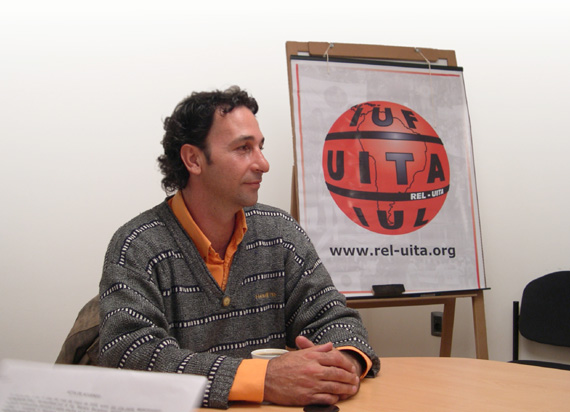The Union of Coca-Cola Workers (STCC)
achieved a major agreement with the
company after having declared a state of
alert that lasted several days and
during which it conducted ongoing
negotiations. SIREL spoke with Gabriel
San Martín, STCC organization secretary,
to learn the details of this agreement,
which once again confirms the importance
of internationally organized labor
struggle.
-How did you achieve this agreement?
-After several stages of negotiation,
yesterday, May 12, we signed an
agreement before the Labor and Social
Security Ministry, in which we were
granted all our demands.
The state of alert was declared when we
learned that the company would be
importing products from Argentina
to cover for the shortage in the
national market. The company claimed
that it had to import products because
of the low productivity of its
machinery, and while the union confirmed
this to be true, it found that it’s due
to poor management. The lack of
maintenance –which the union had
reported in time– led the Coca-Cola
factory in Montevideo to have a
substantially lower output than that of
other regions. Nevertheless, STCC
agreed to future imports but only if
they are carried out within the
regulatory framework and as provided by
a joint management-workers committee,
and provided they are aimed at achieving
an optimal level of production in the
factory, which is what the workers want.
In this sense, STCC will be closely
monitoring the company’s actions, as
there is a rumor that the failure to
service the machinery and the resulting
low productivity could be part of a
commercial strategy of the Coca-Cola
Company directed at facilitating the
sale of the Montevideo Refrescos plant
to FEMSA, the largest Coca-Cola
subsidiary in the world.
-What were the steps taken by the union?
-Besides filing reports with the
relevant bodies, we contacted the Latin
American Federation of Coca-Cola Workers
(FELATRAC). Through Rel-UITA
-the IUF's Latin American
Regional Office- we contacted Raúl
Álvarez and Pablo Quiroga,
whose efforts to support us
internationally were instrumental in
solving this conflict. We’re fully aware
that without FELATRAC’s support we
would’ve never obtained such results.
-What does the agreement signed consist
of exactly?
-The main point agreed on is that if it
ever becomes necessary to import
products, the imports will be done
within a framework established by labor
regulations. The agreement also includes
a guarantee of full employment, which
means that no seasonal or permanent
workers will be placed on the temporary
unemployment program or fired. Also
solved -and this is a very important
point- was the situation of the 22
distribution department workers who will
now be working eight hours a day instead
of the four-hour scheme the company had
put them on.
Another achievement we secured is that
the direct importer will be
Montevideo Refrescos and not any
other company. With this we are
preventing a potentially risky
precedent, one that would not only risk
our situation but that of the entire
beverage industry, as Uruguay
recently eliminated the tariff barrier
applied on beverage imports (what was
known as the “double IMESI” in reference
to an internal wholesale tax) and that
leaves the door wide open for any
company to import freely.
-What is your assessment of the
agreement?
-I think it’s very positive. It sets a
precedent in labor struggles and clearly
strengthens the position of STCC.
It also highlights the importance of
international solidarity, which in this
case was materialized in FELATRAC’s
efforts. The international support
and backing from fellow workers
domestically were both instrumental in
obtaining all our demands..
